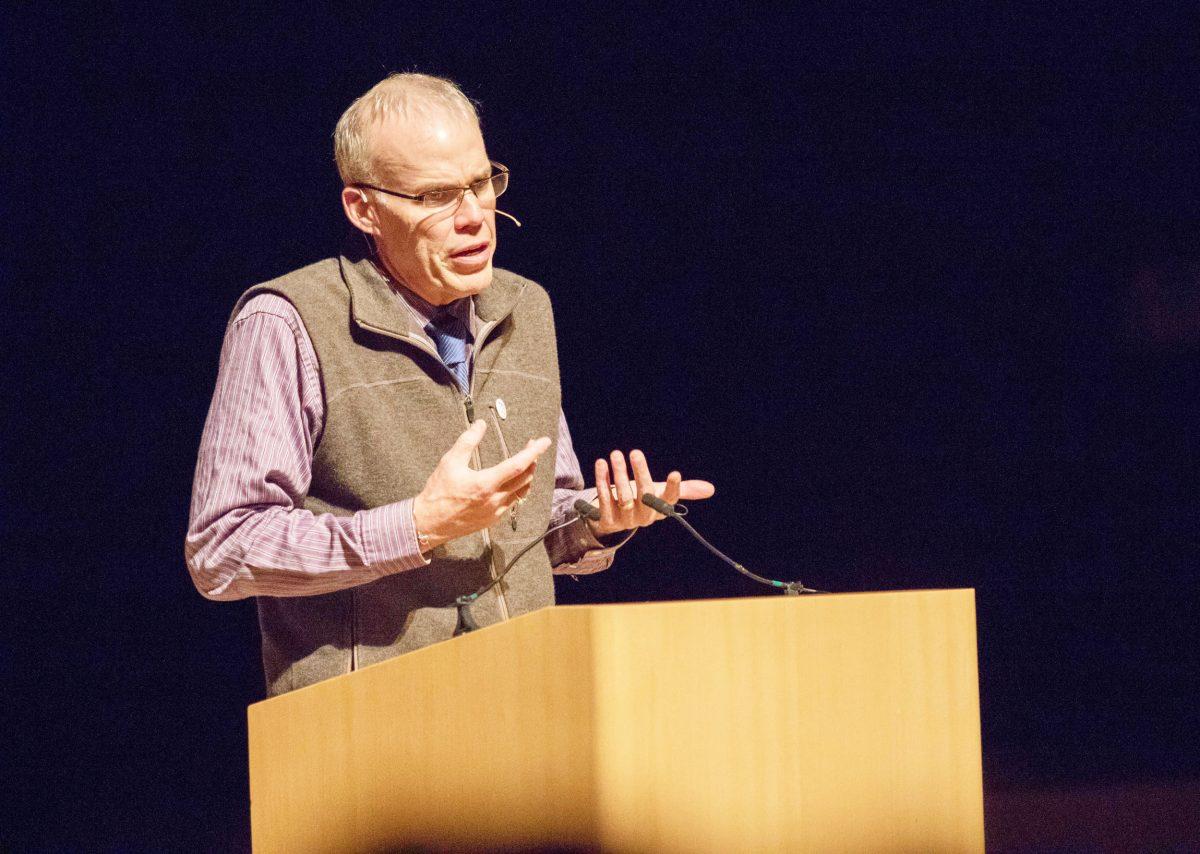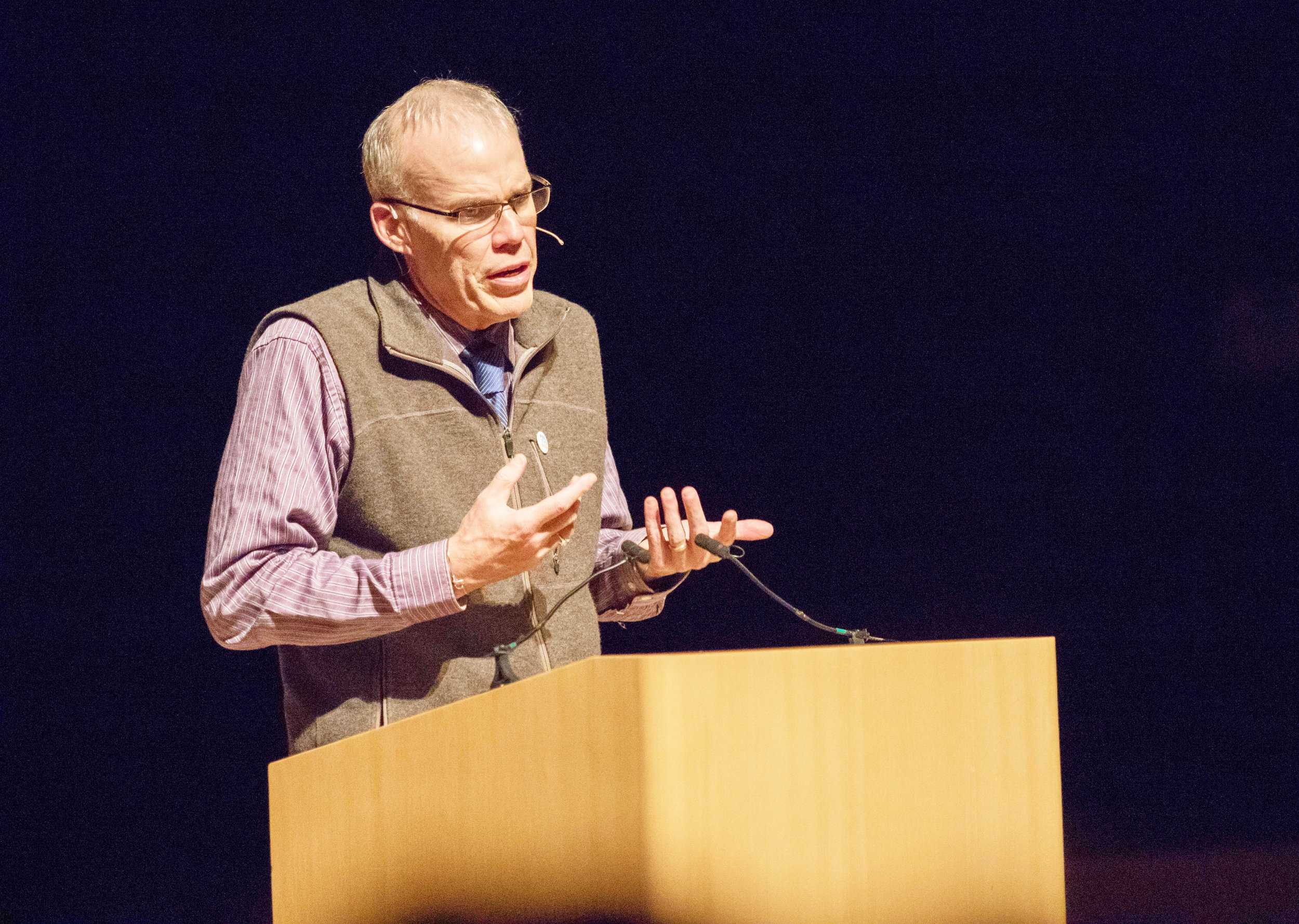As the effects of global warming run its course, the Earth we once knew has changed in fundamental ways that will never be the same, famed author, educator and environmentalist Bill McKibben told a Sonoma State University audience Oct. 18.
Record high temperatures were set in 2014, only to be smashed by temperatures in 2015. Now those temperatures are being smashed by those of 2016, he said. Earth has begun reaching such extreme temperatures that less-developed countries like the Philippines, Ethiopia, Haiti and many more places, people have started to experience such extreme droughts, storm damage and rising sea levels that they are losing their home and livelihoods.
“Ultimately, it is our fault because our daily life decisions contributed to leaving behind a greater carbon footprint and raising the temperature a little over one degrees celsius,” said McKibben, founder and leader of the international environmental organization 350.org. The organization was based on 2007 research that the safe upper limit of CO2 in the atmosphere to avoid a climate tipping point was 350 parts-per-million, ppm. It’s now at closer to 400 parts per million. The amount of CO2 in the atmosphere is rising at about 2 ppm every year, he said.
Meanwhile, as part of the 2009 Copenhagen accord, world leaders agree that 2 degrees celsius, or 3.6 degrees fahrenheit, was the limit that the world could tolerate in terms of temperature rise.
To stay below that level, researchers have estimated that the planet can afford to dump another565 gigatons of carbon dioxide into the atmosphere, which, based on its currently accelerating rate, should occur by 2028.
But, as McKibben points out, fossil-fuel companies have roughly 2,795 gigatons of carbon sitting in their coal, oil and gas reserves. That’s five times more carbon than world leaders have already acknowledged that the planet cannot handle.
That is one of the reasons he and 350.org have supported protests against the Keystone XL Pipeline and the current Dakota Access Pipeline protest in North Dakota. The 1,172-mile Dakota pipeline would deliver fossil fuel from a vast underground oil deposits known as the Bakken Formation near the border of North Dakota and Canada to South Dakota, Iowa and Illinois. But the world can’t afford to store up or use any more oil deposits, McKibben said.
“Unlike 25 years ago, we know what to do. Things like solar power we talked about with our fingers crossed. Engineers have done their job well, the price for solar panels have dropped 80 percent over eight years. This opens up a lot of possibilities for other countries to generate clean energy,” said McKibben.
McKibben has authored a dozen books about the environment, including his landmark publication “The End of Nature” in 1989that triggered an effort to raise awareness aboutclimate change and pressure leading industrial nations around the world to take action. . His book raised awareness about everything: the ice caps and high-altitude glaciers that are melting tothe Tropics expanding 2 degrees north and south thus pushing drought ahead of them and the chemistry of seawater steadily becoming more acidic as the oceans absorb carbon from the atmosphere.
“We’ve already passed the point where we can avoid serious change, and with it the need for a real rethinking of how we’re going to live on this planet,” McKibben said.
During McKibben’s talk in the Green Music Center as part of the 3rd Annual Sustainability Day at Sonoma State, he discussed the path towards sustainability people must take in order to make a positive impact on climate change.
His solution begins with people abandoning their focus on the growth in economics and focusing on smaller scale ways of living.
One way of doing this is by investing in solar energy and windmills, rather than relying on a few centralized power plants.
World leaders know what needs to be done, McKibben said. But there’s a crisis that our species must face; money and power because of the tremendous power of the fossil fuels industry andits willingness to use its money to make sure change does not come, thus preserving the status quo even when that means endangering the planet.
“It was not until a few years ago when investigative reporters including the LA Times announced that fossil fuel industries had scientists that told them exactly how much the Earth will warm up as a result of oil drills and fossil fuel production,” said McKibben. “Rather than telling people, fossil fuel industries decided to keep it a secret and denied the fact climate change was real.”
As a community, McKibben believes people must work together to break the power fossil fuel industries have in order to move forward with clean energy.
For starters, McKibben proposes protesting the mass production of fossil fuels and joining his “350 group.” This group brought countries from all around the world together to make an effort in achieving sustainability through limiting fossil fuel use.
Through organizing on college campuses, online calls to action and massive public demonstrations, 350.org has organizers in more than 188 countries. 350.org stems from the grassroot movement of every community looking to hold its leaders accountable to answer to the realities of science.
For more information, go to 350.org.





![[Both photos courtesy of sonoma.edu]
Ming-Ting Mike Lee stepped in as the new SSU president following Sakakis resignation in July 2022](https://sonomastatestar.com/wp-content/uploads/2024/04/CC4520AB-22A7-41B2-9F6F-2A2D5F76A28C-1200x1200.jpeg)



























